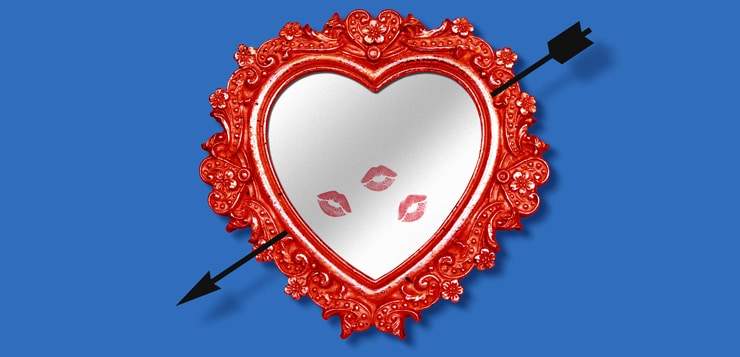Joshua Miller was just starting out as a clinical psychologist at a treatment center for addiction when a new patient sauntered into his office. People with addictions often have other disorders, so Miller was prepared for anything. “The first time we met, he put his feet up on my desk,” said Miller, now a professor at the University of Georgia. “It was a clear display of bravado, dominance, and entitlement”—key ingredients in narcissism. “It was like a dog peeing on your desk,” a show of territorial dominance that spells out, I’m the alpha male here. Don’t mess with me, you insignificant twerp.
There aren’t many personality traits that reference Greek mythology, in this case Narcissus, the beautiful young hunter who disdained human relationships and instead fell in love with his own reflection in a pool of water. While over 2,000 years would seem to be enough time to figure out where narcissists’ extreme self-love comes from, and what they think and feel and believe deep down, the study of narcissism is still shot through with controversies and unknowns.
But lately, Miller says, there is new understanding of the phenomenon. Psychologists are recognizing that, as a personality trait, narcissism can be beneficial in moderate doses. They are identifying what experiences foster it and questioning whether the self-esteem movement (every child should be constantly praised and rewarded for just showing up) may have produced a generation of narcissists.
Numerous studies find that levels of narcissism have been steadily rising among teenagers and young adults in North America. In a 2014 review, Miller and colleagues reported that compared to Americans 65 and older, those in their 20s were nearly three times as likely to have symptoms of narcissistic personality disorder.
Narcissism exists within virtually everyone to a degree, since at its core it is “the drive to feel special, to stand out from the other seven billion people on the planet, to feel exceptional,” argues psychologist Craig Malkin, author of the 2015 book Rethinking Narcissism and director of YM Psychotherapy and Consultation in Cambridge, Massachusetts. Malkin argues that it can be a useful trait, providing self-confidence when we might otherwise give up on a goal. Teens with moderate narcissism tend to be less anxious and depressed, and to have better relationships, than teens at the high or low end of the scale.
Narcissists believe the rules of office behavior, friendship, marriage, and social interaction don’t apply to them.
Scoring at the low end generally indicates basement-level self-confidence and self-regard. This disposition can be crippling: Me? I’ll never be able to do this. I might as well give up. Conversely, extreme narcissism is characterized by a need to be treated as if you’re uniquely gifted, superior, and valuable. It breeds entitlement—Since I’m so great, I deserve everything I have and more—and a willingness to exploit: What are the inferior good for, anyway, other than to serve the superior? Extreme narcissists have little empathy: Feeling other’s pain makes no sense to them.
When narcissists are challenged—especially to the point of humiliation—they tend to lash out in an effort (often subconscious) to preserve superiority. His biographers say that Steve Jobs was an extreme narcissist, infamous for screaming at his employees and calling them a term for fecal matter whenever he felt their performance, which would reflect on him, was lagging.
Did he or other super-achievers have a mental disorder? Narcissistic personality disorder was almost dropped from the latest (2013) edition of the American Psychiatric Association’s diagnostic manual (the DSM-5), partly because people with this constellation of traits are not necessarily distressed or impaired by them. (A condition must cause distress or impairment to be considered a mental disorder, according to the DSM.) The debate highlighted an important facet of extreme narcissism: People who have the disorder do not rate its core traits—including sky-high self-regard and even the antagonism they typically feel for others—as undesirable. This research, presented by psychologist Joanna Lamkin of Baylor College of Medicine at the 2017 annual meeting of the Association for Psychological Science, found that narcissists don’t mind their egotistical traits: “They don’t want to change.”
The debate highlighted an important facet of extreme narcissism: People who have the disorder do not rate its core traits—including sky-high self-regard and even the antagonism they typically feel for others—as undesirable.
The suspicion that narcissists secretly know, deep down, that they’re merely ordinary is therefore almost certainly wrong. Psychologists once thought they might harbor such self-doubts, explaining why they lash out viciously when challenged. Some still argue that the outward swagger and braggadocio masks profound self-doubt. But the emerging view is that there are in fact two forms of narcissism. Both have the core characteristic of extreme self-regard. On one hand, “grandiose narcissism” is marked by what Miller calls “florid immodesty” and extreme feelings of entitlement, which makes grandiose narcissists disagreeable, aggressive, outspoken, assertive, show-offy, and extroverted. In contrast, “vulnerable narcissists” don’t think of themselves as better than everyone, Miller said; their high self-regard is absolute, not relative to others. Grandiose narcissists are people like Steve Jobs and, according to a famous 1997 study, US presidents. Most of them, from Washington to Reagan, qualified as moderate to extreme grandiose narcissists, judging by descriptions in historical records. Chester A. Arthur had the highest narcissism score; Calvin Coolidge, the lowest.
When grandiose narcissists lash out, they’re not defending a secretly doubted superiority. Instead, they believe the rules of office behavior, friendship, marriage, and social interaction don’t apply to them. Being questioned and disagreed with are intolerable assaults on their superiority, and they make risky decisions because of “overconfidence in their own knowledge and abilities,” Miller said. Bernie Madoff thought his brilliance would let him fool not only his clients but also government regulators. This delusion earned him a 150-year prison sentence.

The roots of extreme narcissism lie in what psychologists call “parental overvaluation.” In a 2015 study in Proceedings of the National Academy of Sciences, researchers in Europe concluded that “Children seem to acquire narcissism, in part, by internalizing parents’ inflated views of them, for example, ‘I am superior to others’ and ‘I am entitled to [special] privileges.’” But lack of parental warmth, which children might overcompensate for by pumping up their self-regard, was exonerated, and so was the general self-esteem movement, unless parents really overdo it.
Parents probably can’t create an extreme narcissist from scratch, said Miller. Instead, inflated praise feeds what are likely genetic seeds of narcissism. “Of all the personality disorders, narcissism has the strongest genetic component,” psychologist Sander Thomaes of the Netherlands’ Utrecht University told the 2017 Association for Psychological Science meeting. The predisposition is exacerbated by telling children what they did is “fantastic, perfect, or extremely well done.” Narcissism tends to take hold in a child’s personality around age seven or eight, he said.
According to Miller, there is no empirically validated therapy for extreme narcissism, and less traditional approaches probably aren’t going to help. Scientists at the University of Amsterdam wondered if narcissists might benefit from mindfulness. As reported in the journal Self and Identity in 2017, they had volunteers (who rated very high on a scale of narcissism) engage in a five-minute exercise of focusing on the physical sensations of breathing, while observing any thoughts without judgment.
The debate highlighted an important facet of extreme narcissism: people who have the disorder do not rate its core traits as particularly undesirable.
Apparently, since narcissists’ thoughts tend toward their greatness and specialness, the absence of judgment let those thoughts run unchecked and unquestioned—so much so that their ability to identify emotions in people by reading their eyes actually worsened. Mindfulness seemed to give the narcissists “license to focus even more on their self-aggrandizing thoughts,” the researchers wrote, with the result that they could barely perceive others’ mental states. When it comes to narcissists, perhaps the contents of their thoughts are better left unexamined.
The Myth of Narcissus
Narcissus was known to be proud, and he held himself above everyone else, including those who loved him. Nemesis—the goddess whose job it was to mete out punishment for hubris (arrogance toward the gods)—could see how Narcissus was carrying himself. So she caused him to be attracted to a pool, where he saw his own reflection in the water. He immediately fell in love with it and was unable to understand that it was merely an image. Narcissus clung and clung to the beauty of his reflection, until he cared about nothing else. He stared at his reflection until he died.
This article appeared in the February 2018 issue of Mindful magazine.







